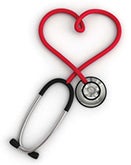Nuclear Medicine
Nuclear Medicine tests are diagnostic exams used to evaluate the supply of blood to the heart muscle. Your heart’s blood supply comes from the coronary arteries. If these arteries are narrowed or blocked, your heart does not receive the blood it needs. This test allows the doctor to see how well your heart is working.
A special camera takes pictures of your blood as it flows through your heart during rest and after exercise. A nurse will place an IV in your arm. A radioactive imaging agent will be injected into your IV, and the camera will scan to see the blood flow to your heart. A cardiologist or radiologist will compare pictures of your heart at rest and after exercise. If you are not able to walk on a treadmill, a medicine (Lexiscan, adenosine or dobutamine) will be given to you to speed up your heart.
Medical Stress Test
About half of the patients recommended for a cardiac stress test are unable to use a treadmill. In these cases, drugs are used to replicate the results. Dobutamine is one of the medications used in cardiac stress tests. The medication, which increases the blood flow in the coronary arteries, is given intravenously (IV) prior to the test.
During the Test
During a Medical Stress Test, your heart's electrical activity, blood pressure, and oxygen levels are monitored.
The medication makes your heart beat faster to replicate exercise. This takes about 10 seconds and is followed by a saline solution.
Before a Nuclear Medicine Test
For 24 hours prior to the test, avoid all foods, beverages and medications containing caffeine. Many over-the-counter medications have trace amounts of caffeine, so please discuss this with your doctor. In most cases, your doctor will also recommend that you discontinue any heart medications, but please follow his/her instructions. If you use an inhaler for asthma or other respiratory conditions, please bring it with you. If you have diabetes, please talk with your doctor about the recommended preparations as there are some precautions you should take.
On the day of the test, do not eat or drink anything, except water, for four hours prior to test. Also, if you smoke, do not smoke on the day of testing. Dress in comfortable, loose-fitting clothes, and wear shoes that you typically use for walking. A shirt or blouse that buttons in front is helpful for placing the electrodes.
After a cardiologist reviews your nuclear exercise stress test, you will be contacted for a follow-up appointment to discuss your test results and the next steps on caring for your heart.
During a Nuclear Medicine Test
When you are in your room, an IV will be placed in your arm. The radioactive imaging agent will be given to you through the IV. There will then be a one hour delay. After the delay, the camera scan for the rest study will be done. You will lie on your back while the camera moves around you for about 15 minutes.
After the rest study, electrodes will be placed on your chest, and a blood pressure cuff will be placed on your arm. This is done to prepare for the exercise study. A cardiologist will monitor you during the exercise study.
If you are unable to walk on a treadmill, or if it is unlikely that you will reach an adequate exercise level to stress your heart, Lexiscan, adenosine or dobutamine will be given to you through your IV.
You might feel flushed or you might have chest pain and/or shortness of breath. These feelings are normal, but tell your doctor.
When you reach your peak exercise level, you will again receive radioactive imaging agent through your IV. There will be another one hour (maybe less if you walked on a treadmill) delay. After the delay, the camera scan will be done again. If your doctor chooses to use thallium as the imaging agent, you may have a camera scan the next day. These tests may take three to six hours.

Learn More About Cardiovascular Tests
After Your Nuclear Medicine Test
Check with your nurse about when you can eat, drink and return to normal activities.
For additional information about echocardiogram tests, contact us today at 919-350-5390.